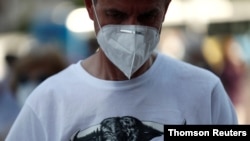Chanting “We are culture,” matadores and bullfighting supporters demonstrated on Saturday across Spain, seeking government support for the sector after the coronavirus pandemic halted its season.
Major festivals such as Sevilla’s April Fair and Pamplona’s San Fermin in July have been canceled, and bulls have been sent from ranches straight to the slaughterhouse. The shutdown could deal a fatal blow to a controversial spectacle that has struggled for survival in recent decades.
“The COVID-19 crisis has had an enormous impact ... It has reduced almost by 100 percent the scheduled events for the year and all the families that live off bullfighting have been too affected,” said Juan de Castilla, 25, a Colombian bullfighter at a protest in the central city of Guadalajara.
There were also protests on Saturday in Seville, Madrid and Barcelona, among other cities.
Several hundred masked people marched in Guadalajara, waving Spanish flags with bull figures and holding banners in support of the traditionally emblematic Spanish spectacle.
The Spanish government has allowed bullfights to resume but with only half occupancy and a limit of 800 attendees in regions with lesser lockdown restrictions.
“We have come to proclaim that the bullfighting world is important for society, Spain and Guadalajara,” said Jesus Romero, 58.
He said bullfights, also known as “corridas,” should resume soon since Spain is gradually lifting its lockdown -- one of the strictest in Europe. The country has now contained the coronavirus spread, which has killed over 27,000 people.
Although the big festivals still draw crowds, public interest in bullfighting has dwindled considerably.
Over 56 percent of people were against bullfighting, 24.7 percent in favor and 18.9 percent indifferent in a poll published last year by news website El Espanol. Support was significantly higher among conservative voters, it showed.





